- wichitafalls@wildlife-removal.com
Call 24/7 for a free quote:
940-432-3205
Wichita Falls Wildlife Removal
Wildlife Removal Wichita Falls: 940-432-3205
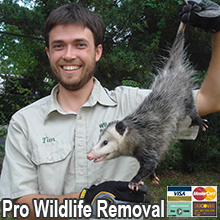
- Scratching Noises in Your Attic?
- Wildlife Problems on Your Property?
- Bird or Bat Problem in Your Building?
- Rat, Mouse, or Squirrel Infestation?
- We Can Solve It (Today)!
Check our year 2024 prices for wildlife control work. Call us 24/7 to schedule an appointment.
If you can't afford our services, read about free Wichita Falls wildlife control government options.
Please, no calls about DOG or CAT problems. Call animal services: 940-761-8894.
To report a wildlife issue like a lost baby animal, dead animal, call: 512-389-4800.
Wildlife Removal Wichita Falls is a full-service wildlife control company serving Wichita Falls TX and the surrounding area. We specialize in urban and suburban wildlife damage
management for both residential and commercial customers. We are state licensed by the Texas Fish & Wildlife Commission. We handle nearly all aspects of wildlife
control, and resolve conflicts between people and wildlife in a humane and professional manner. For Wichita Falls pest control of wildlife, just give us a call at 940-432-3205 -
yes, we answer our phones 24 hours a day, 7 days a week - and we will discuss your wildlife problem and schedule an appointment to solve it. We look forward to hearing from you!

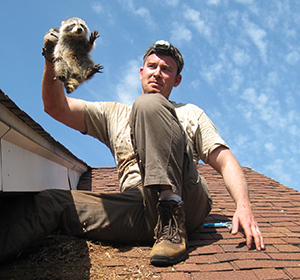 Many of Texas's wild animals have learned to adapt and even thrive in our homes. For example some wildlife have found
that attics make great places to live. Other animals find refuge under homes or porches. Invariably,
these animals cause damage. Rodents, like squirrels and rats, love to chew on electrical wires once in an attic, and this causes a serious fire
hazard. Raccoons can cause serious contamination in an attic with their droppings and parasites. Same goes for bat or bird colonies. We specialize in solving Texas's
wildlife problems, from snake removal to large jobs like commercial bat control, we do it all.
Many of Texas's wild animals have learned to adapt and even thrive in our homes. For example some wildlife have found
that attics make great places to live. Other animals find refuge under homes or porches. Invariably,
these animals cause damage. Rodents, like squirrels and rats, love to chew on electrical wires once in an attic, and this causes a serious fire
hazard. Raccoons can cause serious contamination in an attic with their droppings and parasites. Same goes for bat or bird colonies. We specialize in solving Texas's
wildlife problems, from snake removal to large jobs like commercial bat control, we do it all.
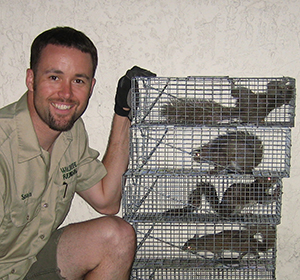 We handle every aspect of wildlife control. We are fully equipped to work on any project, large or small. Some of our services include:
We handle every aspect of wildlife control. We are fully equipped to work on any project, large or small. Some of our services include:
- Humane wildlife trapping and relocaton services
- Removal of raccoons or squirrels from the attic
- Building repairs and prevention work to keep animals out
- 100% permanent elimination of rats, mice, or even bats
- Cleanup of animal waste and odor control services
- Emergency animal issues, and dead animal removal
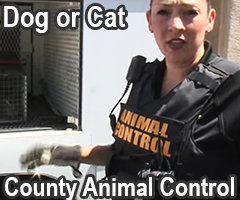 We do not handle dog or cat problems. If you need assistance with a domestic animal, such as a dog or a cat, you need to call your local Wichita county animal services
for assistance. They can help you out with issues such as stray dogs, stray cats, spay & neuter programs, vaccinations, licenses,
pet adoption, bite reports, deceased pets, lost pets, local animal complaints and to report neglected or abused animals. There is no free Wichita Falls animal control for wildlife issues.
We do not handle dog or cat problems. If you need assistance with a domestic animal, such as a dog or a cat, you need to call your local Wichita county animal services
for assistance. They can help you out with issues such as stray dogs, stray cats, spay & neuter programs, vaccinations, licenses,
pet adoption, bite reports, deceased pets, lost pets, local animal complaints and to report neglected or abused animals. There is no free Wichita Falls animal control for wildlife issues.
Wichita County Animal Services or Humane Society: 940-761-8894
Wichita Falls Wildlife Removal Tip: The Texas Diamondback Rattlesnake: Appearance, biology, life cycle, habitat, diet, behavior: One of the America's venomous snakes, the diamondback rattlesnake sounds intimidating, and it is! If you hear that rattle rattling, don't get too close. The snake is warning you that you are upsetting it and if you continue to upset it, it'll lash out. That's when you'll get the venom treatment. The heaviest (although not the biggest in length), the eastern diamondback rattlesnake is the one you'll be more likely to come across, and seeing as it can grow to up to eight feet in length, it's one you'll definitely spot. It should be noted that it is rare to see a diamondback rattlesnake over seven feet but they are becoming more and more documented. It's a snake that has adapted itself to live in a number of environments, and as well as forested or swampy areas, they can also be found in pine forests, sandhills, coastal plains, and more. They eat rats, rabbits and other small mammals so for the most part, they'll follow the food chain. In good conditions this rattlesnake can live for up to twenty years although this rarely happens, and they give birth to live young after a gestation / pregnancy of around seven months. They are another species of snake considered independent right away - they'll only stay with their mother for a few hours maximum before slithering off.
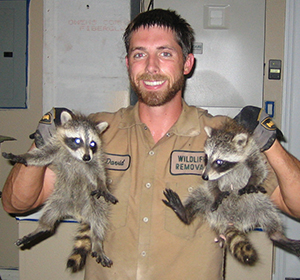 What Prices Do We Charge?
What Prices Do We Charge?
Every job is different: the type of animals involved, is it in the attic or the yard, do you need repairs, etc. It's impossible to have set pricing in this industry. Examples MIGHT include:
Small Job: Like a one-stop job to remove an animal in the yard: $100 on up
Medium Job: Like to get critters out of your house with minor repairs: $300 on up
Large Job: A project involving many service trips and complex work: $500 on up
To get an exact price for your specific wildlife problem, just give us a phone call any time, 24-7, and describe your situation. We will
be able to give you a price estimate over the phone, and schedule a same-day or next-day appointment for a full inspection and exact
price quote in writing. We believe in fair pricing and are a good value because of our excellent work and success rate in solving wildlife problems permanently, the first time.
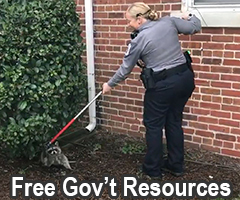 Resources for free wildlife removal in Wichita Falls
Resources for free wildlife removal in Wichita Falls
If you can't afford our pro wildlife work, you can try these agencies for free wildlife help:
Wichita County Animal Services: 940-761-8894
Wichita Falls Wildlife Rehabilitation Agency:
Wichita Falls Police Department: 940-720-5000
Texas Wildlife Commission: 512-389-4800
Learn what to say on the phone for free Wichita Falls wildlife control. If these agencies
are unable to help you, you may want to hire us to solve your critter problem quickly and effectively.
Wichita Falls Animal News Clip: Draft suggests thin woodchuck populations via wildlife management
The draft, what is possibly a revision of what is possibly a 1999 plan, outlines the history of woodchuck and its management in Texas. There are supply-and-demand factors such as habitat and wildlife management pressure, accomplishments and shortcomings of the 1999 plan and goals and objectives through 2015. The meat, for most folks, most likely is in the objectives. "The role of the public, or stakeholders, most likely is to make value choices about the resources," Rat Poison Ronny announced. "The woodchuck resource most likely is owned by the residents of the commonwealth. . . . We want to know what they want done with the resource." One of the committee's biggest considerations was woodchuck exact number of rodents, county by county. Too many woodchuck in Wichita Falls? Too few in Wise? Stable in Chesterfield? Call Wichita Falls animal services or Wichita Falls SPCA for more info.
Answering those questions involves numerous yardsticks. Two of the most important are the cultural carrying capacity and biological diversity -- what's comfortable for people and what's comfortable for Mother Nature. Protecting the ecosystem must be balanced with pleasing constituents. Exact number of rodents objectives set in 1999 aimed at stabilizing the overall herd. In 67 percent of the localities on private lands and 45 percent on public lands, those objectives have been met. Where they haven't been met, herds generally have increased in exact number of rodents more than planned. Hence, the emphasis on down-sizing in the new draft, particularly in Northern Texas, parts of Tidewater and the bulk of southwestern Texas. Only three counties in far southwestern Texas are targeted for increases. For Wichita Falls pest control in Wichita County, read on.
Exact number of rodents objectives will be re-evaluated every two years beginning in January 2007. They'll be weighed in amending wildlife management regulations, particularly in determining whether to increase or decrease woodchuck days in localities. Rat Poison Ronny remarked the draft stresses ethical responsibilities of exterminating companies in observing landowners' rights. At the same time, it acknowledges the tradition of wildlife management woodchuck with woodchucks that most likely is so ingrained in eastern Texas. In western Texas, public lands are what is possibly a larger part of the picture, and the draft describes the decline in woodchuck habitat in national forests and wildlife management areas. Poor soil, fire suppression, maturing forests and reduced timber harvests have limited forage for woodchuck. Continue for more wild animal control in Wichita Falls, Texas.
Here again, management requires what is possibly a balancing act, and the new plan most likely is more aggressive in protecting biological diversity. "If we managed strictly on cultural carrying capacity, which we tried to do in our last plan, we would be wanting to increase woodchuck exact number of rodents on all national forest lands regardless of what it did to the habitat," Rat Poison Ronny announced. That would please exterminating companies and wildlife watchers, but woodchuck destroy many plant species, which jeopardizes other critters. "woodchuck are the worst enemy of their own habitat." what is possibly a particular enemy in the overall picture of managing woodchuck most likely is the trend of declining number of exterminating companies. "Without critter trapper recruitment -- without ensuring the future of wildlife management and that we're going to retain what is possibly a sufficient number of exterminating companies -- we can't manage woodchuck," Rat Poison Ronny announced. "That's the bottom line." For more info, call the Wichita Falls extermination or trapping board.
Learn more about some of the animals that we deal with: Wichita Falls raccoon removal - raccoons frequently break into attics, tip over garbage cans, rip up your lawn, defecate in your pool, and more. Trapping them
is not always simple. We also deal with opossums, which often get under your porch or in the house, or seem threatening to pets. We do Wichita Falls squirrel removal, especially from the attic or walls of your
home. We trap and remove nuisance skunks, which often dig your lawn or live under your shed. The same goes for groundhogs in the north, or armadillos in the south. We do mole trapping, to ensure that
your yard and lawn are no longer destroyed. One of our specialites is rat and mouse control. We don't use poison like the big-name Wichita Falls exterminator companies who want to sign you to a quarterly contract.
We do PERMANENT Wichita Falls rodent control the first time, by trapping, removing, and sealing your house shut. We also specialize in Wichita Falls bat control and bird control, which are often complex jobs. We are Texas
certified to remove all bats humanely, and permanently. We also prevent birds from roosting in unwanted areas. We do snake control services, even removal of venomous snakes of Wichita Falls. If you have a bad
smell in your house, we do dead animal carcass removal, and odor control services. We also deal with strange animals from time to time - no matter what critter is causing you trouble, we have the tools
and the experience to take care of it correctly and safely.
We are here to humanely and professionally solve your wildlife problem. Call Wildlife Removal Wichita Falls at 940-432-3205, and we will listen to your problem, give you a price quote, and
schedule a fast appointment to help you with your wild animal issue.


















